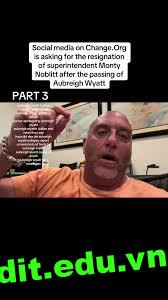Did Molly Noblitt pass away? This question has been circulating across social media platforms, particularly TikTok, where users are seeking clarity and understanding about the events surrounding her life and untimely death. A bold statement that resonates with many is that Molly Noblitt's actions during her lifetime left a significant impact on those who encountered her, whether directly or through digital spaces. Her story serves as a reminder of the importance of empathy and kindness in our interactions with others.
The narrative of Molly Noblitt’s life extends beyond mere headlines. Born into an average family in Mississippi, she grew up in a community where relationships were often tested by the challenges of adolescence. Molly became infamous after videos emerged showing her mocking Aubreigh Wyatt, a peer who tragically passed away at just 13 years old. The incident sparked widespread outrage, highlighting issues such as bullying, grief, and accountability within school environments. As details unfolded, it became evident that Molly's behavior had profound consequences not only for herself but also for those around her.
| Full Name | Molly Virginia Lee Noblitt |
|---|---|
| Date of Birth | March 12, 2007 |
| Date of Passing | November 21, 2024 |
| Cause of Death | Suicide |
| Place of Birth | Ocean Springs, MS |
| Family Members | Mother: Kathryn Noblitt; Father: Montgomery Noblitt; Brothers: Deuce and [name] |
| Education | Attended local schools in Ocean Springs |
| Professional Details | Not applicable (student) |
| Reference Website | Obituary Page |
Aubreigh Paige Wyatt, whose tragic passing occurred on September 4, 2023, was only 13 when she died in Ocean Springs, Mississippi. Her obituary highlighted her young age and the suddenness of her departure, leaving behind a grieving community. Aubreigh’s story gained national attention due to the subsequent actions of Molly Noblitt, who reportedly made light of the situation by creating content that mocked Aubreigh posthumously. This act drew criticism from peers, parents, and educators alike, emphasizing the need for stricter measures against cyberbullying.
As discussions continued online, questions arose regarding Molly Noblitt's intentions and the broader implications of her actions. Some argued that her behavior stemmed from immaturity compounded by societal pressures, while others pointed towards systemic failures in addressing mental health concerns among teenagers. Regardless of perspective, there remains consensus that education systems must adapt to tackle emerging forms of harassment effectively.
Furthermore, examining how communities respond to incidents like these provides insight into cultural attitudes toward justice and reconciliation. In Molly Noblitt's case, public backlash forced her into isolation, culminating eventually in her own suicide less than two years later. While some may view this outcome as poetic justice, others see it as another victim lost to preventable circumstances—an endless cycle perpetuated by lack of dialogue and support structures.
In analyzing both sides of the story, it becomes clear that neither party emerged unscathed. For families involved, including relatives of Aubreigh Wyatt and Molly Noblitt, healing requires acknowledging shared pain rather than assigning blame exclusively. Moving forward necessitates fostering environments where open communication thrives alongside proactive interventions aimed at reducing harm caused by bullying behaviors.
Beyond individual tragedies lies an opportunity for collective growth. Schools nationwide have begun implementing programs designed to combat bullying through awareness campaigns, counseling services, and policy reform. These efforts aim not only to protect potential victims but also to guide perpetrators toward redemption paths before irreversible damage occurs.
Ultimately, remembering individuals like Aubreigh Wyatt and Molly Noblitt compels us all to reflect on our roles within interconnected networks. By prioritizing compassion over conflict, we honor their memories best—not merely as cautionary tales but as catalysts inspiring positive change across generations.



